19 Beautiful Japanese Words to Bring Meaning to the Ordinary
Looking to learn some beautiful Japanese words with meanings? Over the years, learning new words in Japanese has evolved into a passion of mine. If I could sum up my findings so far, it’s that Japanese culture makes us aware of small details that were always there but didn’t necessarily notice before.
Despite obsessively researching my first trip to Japan over a decade ago as I do for all destinations I visit, I returned with the realisation that there is always so much more to learn (hence my multiple trips thereafter). Their language and aesthetic Japanese words are no exception!

I now have an insatiable appetite to quash my curiosity and fascination with Japanese culture, religion and aspects of day-to-day-life. Learning through language is a great way to achieve this, and I love sharing all these findings with you throughout my Japan travel blog.
This comprehensive guide is a collection of my favourite Japanese words and phrases that have helped bring more meaning into my life – and I hope they will for you, too!
This post contains affiliate links, at no extra cost to you. I may earn a small commission if you click through and make a purchase.

19 Beautiful Japanese words to bring meaning to the ordinary
Not only have I categorised this list into beautiful Japanese words, I’ve also included motivational, meaningful, inspirational and untranslatable expressions.
Beautiful words in Japanese
Let’s get started with the amazing Japanese words about life complete with their meanings. Which will you use often?
Ikigai
生きがい
This is perhaps my most favourite of the beautiful words in Japanese. When browsing an airport bookstore, I first learnt this beautiful Japanese word when I saw this paperback ranking highly on the bestseller shelves. Intrigued by the blurb and promise, I excitedly bought the book and dove right into it.
What I didn’t realise was ikigai is the word used to describe the very passion that gets you out of bed in the morning; your reason for being. It’s a combination of what you’re good at, something you love and something the world needs. Just ask any centenarian in Okinawa why they still enjoy working everyday (my guide to things to do in Okinawa details more).
Japanese people believe everyone has an ikigai, they just need to find it. On completing the book, I recognised that this very blog you’re reading, right now, has been my ikigai since I launched it in 2017. My passion for sharing responsible travel tips, advice and my love of Japan with you is what I look forward to each and every day.

Ichi go ichi e
一期一会
This is one of the most insightful and unique Japanese words I’ve had the pleasure of learning from an actual geisha. During my traditional tea ceremony in Kyoto, it was explained that ichi go ichi e has very strong ties to enjoying tea in Japan.
TIP: Thinking of visiting Kyoto soon? My 4 day Kyoto itinerary will help you out!
Translating to “once in this lifetime,” ichi go ichi e serves as a gentle reminder for us to treasure each individual moment as can never truly be replicated again.
Even if you invited the same people to enjoy tea at a later date, at the same time, wore the same clothes etc, aspects of the encounter would always differ to the original, such as conversation or weather.
This concept can be applied to each and every situation throughout life. Isn’t it fascinating?

Nakama
仲間
This is one of the cute Japanese words! A nakama can be described as a very good friend that one considers family, even if they’re not related by blood. You never know, you might end up making a nakama when undertaking cultural experiences in Japan.
Perhaps it’s a friend you frequently see, or the kind of friend you only have the chance to catch up with once every few years in person as they live far away. But when you do, the bond of friendship is so strong it’s like all that time in between has never passed!
Do you have a nakama?
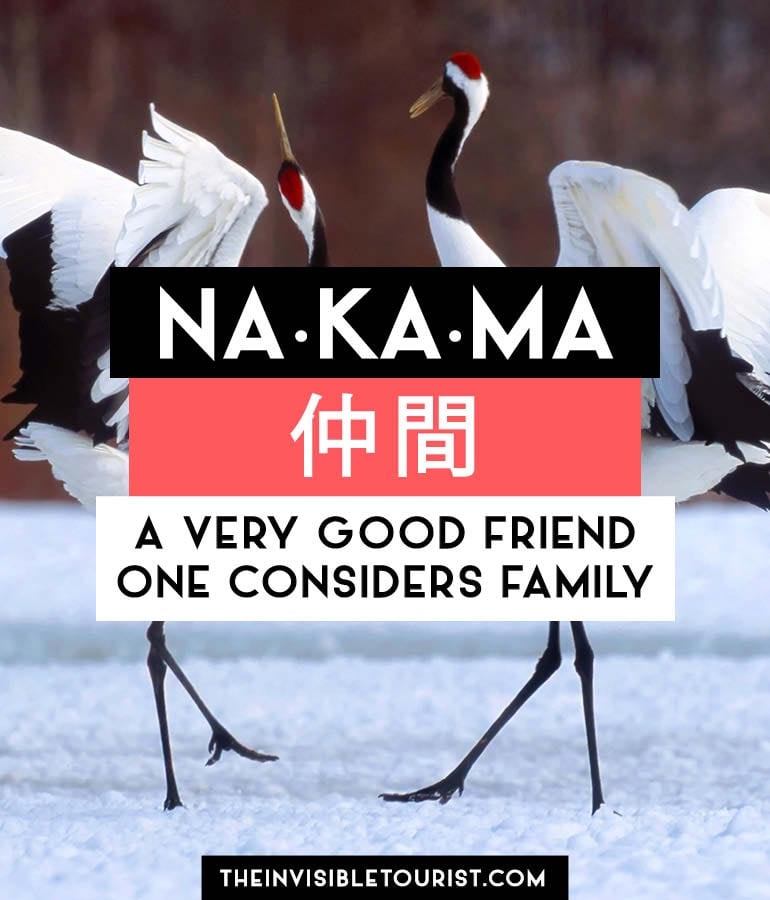
Wabi sabi
侘寂
It’s difficult to sum up the meaning of wabi sabi into a few short words. Deriving from Zen buddhism, in the simplest form it could be described as the acceptance of finding beauty in imperfections and the impermanence of things.
Finding beauty in flaws is a huge part of Japanese aesthetics. In a world where striving to achieve perfection is prioritised, it’s nice to see a contrasting perspective is also widely accepted throughout Japan. Perhaps more of us should view imperfections in this way? More about wabi sabi here.
TIP: A great example of wabi sabi is kintsugi, which I describe in more detail further down the page.
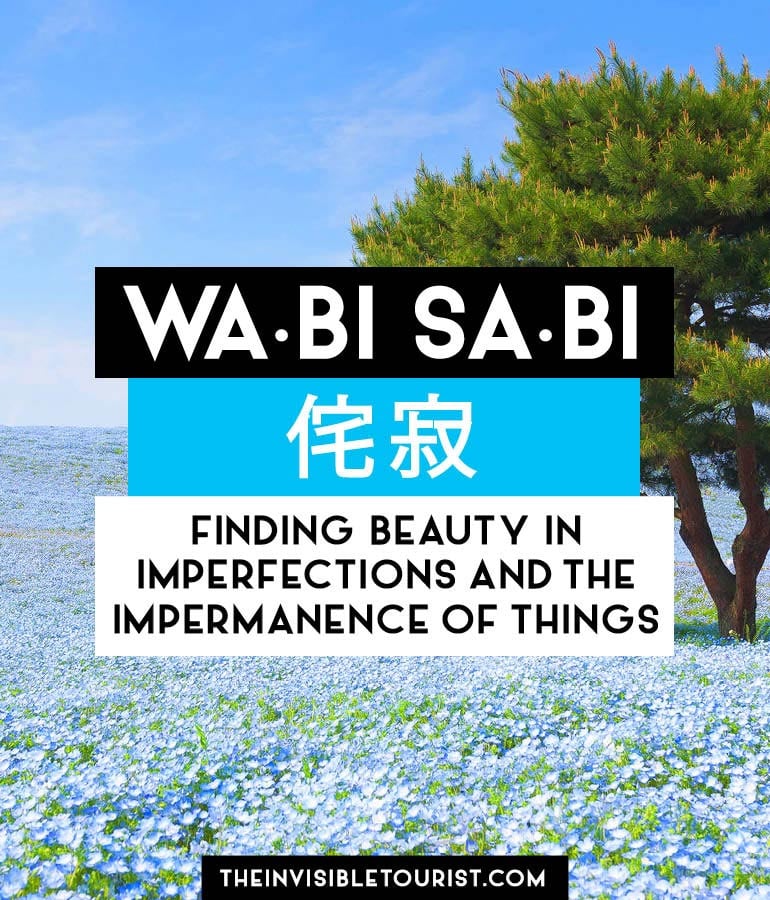
Natsukashii
懐かしい
Do you ever come across old items or photographs that warm your heart? Even the scent of perfume or candles can evoke particular memories. Natsukashii is that feel-good emotion of sentimentality when remembering back to a time you hold close to your heart.
I certainly feel this when I think back to my time swooning over cherry blossom petals bathing in the setting sun’s orange glow in Kawagoe!
Natsukashii differs from nostalgia in a way because it’s not the feeling of longing to return to that particular time. It’s simply feeling grateful to have had a particular experience in the past without the desire to return to that moment.

Kintsugi
金継ぎ
This beautiful practice is believed to date back to 15th century Japan. Kintsugi translates to “the art of broken pieces” whereby broken pottery was repaired with gold, rather than being discarded.
Filling the cracks with gold is an indication that flaws can be seen as a unique part of the object’s history, which adds to its overall beauty and character.
I recently learnt the brand Siletti has a range of kintsugi-style crockery that allow you to bring the look of this centuries-old tradition into your home in a modern way.
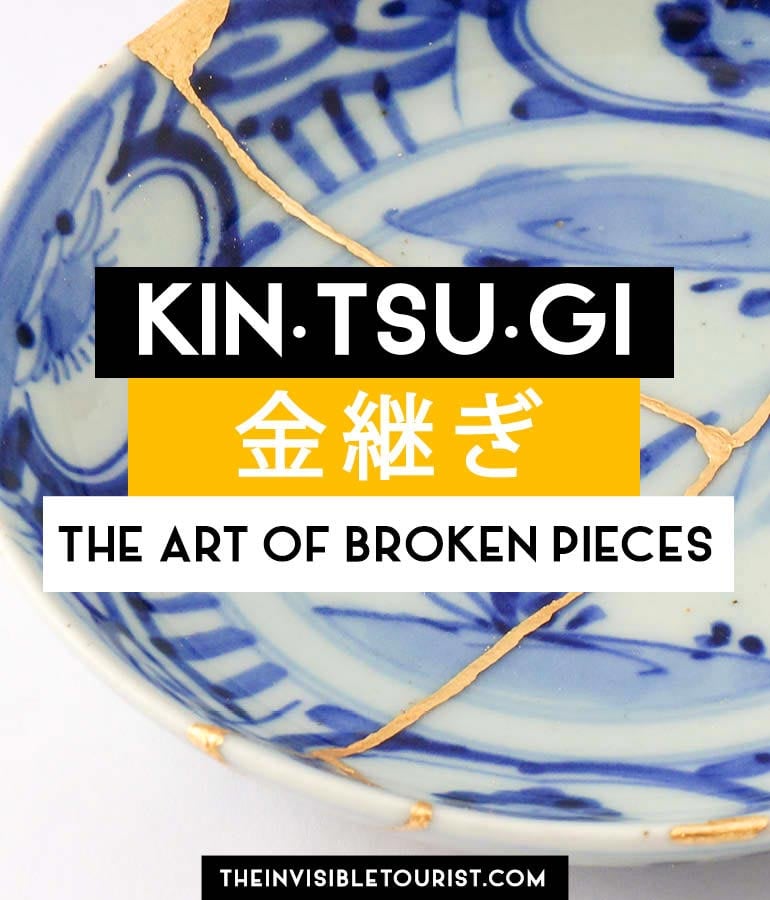
Motivational Japanese words
Ame futte ji katamaru
雨降って地固まる
If any nation were to claim ame futte ji katamaru as their unofficial motto, it would have to be Japan. As a country that has natural disasters such as earthquakes and volcanic eruptions to thank for its creation, the saying “after the rain, earth hardens” is quite fitting.
What this means is overcoming adversity builds character and resilience. It’s believed that after a storm, things tend to stand on more solid ground than they did before.
Just take the last 100 years for example. The people of Japan have endured the Great Kanto Earthquake of 1923, the nuclear bombings of Hiroshima and Nagasaki in 1945, the Great Kobe Earthquake of 1995 and the Great Tohoku Earthquake of 2011 resulting in a devastating tsunami and nuclear meltdown.
Aside from the ongoing cleanup from the 2011 Fukushima area disaster mentioned above, today you’d be forgiven for thinking each of these locations never endured such hardship – they’ve rebuilt stronger than before.

Ganbaru
頑張る
The Japanese word ganbaru can be used as an expression of encouragement. However, it can have several meanings, ranging from “to do more than one’s best,” “to stand firm,” “to endure.” It encapsulates having focus and determination to step outside your comfort zone and achieve goals.
To fully comprehend how to use ganbaru, this article goes into great detail!

Nanakorobi yaoki
七転び八起き
Translating to “Fall down seven times, stand up eight,” this has got to be one of my most favourite motivational Japanese words. It’s always a great reminder to never give up on your goals, no matter how many obstacles you encounter along the way.
Did you know Daruma dolls are said to be linked to the saying nanakorobi yaoki? Their rounded shape is symbolic of having a fighting spirit to overcome adversity. Representing good fortune and perseverance, Daruma dolls make the perfect Japanese souvenirs!

Hikari wa subete no yami no naki ni arimasu
光はすべての闇の中にあります
This is one of the Japanese words with deep meaning. Translating to “There is light in all darkness,” this Japanese phrase is sa great little reminder that even at the darkest of times, there is light to be found.
The English word equivalent would be “every dark cloud has a silver lining,” meaning out of a bad situation there is hope that good things can happen.

Japanese words with deep meaning
Shinrin yoku
森林浴
This is first up for our Japanese words with deep meaning. In our fast-paced, digitally-connected world of bustling cities, the art of shinrin yoku plays a very important role in Japanese culture. Translating to “forest bathing,” these two meaningful Japanese words help us remember to immerse ourselves in nature as often as possible to reconnect with our natural environment.
Believed to have healing properties and serve as a kind of preventative medicine, practicing shinrin yoku allows us to temporarily forget about our modern troubles, eye-straining screens and day-to-day nuances.
To awaken a sense of connection to nature, the aim is to to really slow down and use all our senses to take in the surrounding scenery… The sounds of birdsong; the motion of leaves swaying in the breeze; the smell of recent rains or nearby flowers. Without realising at the time, I was able to achieve this in the tranquil moss forests of Kyoto.
TIP: Interested in learning more about shinrin yoku and how it can help you, even if you don’t have any forests nearby? I can highly recommend this book by two of my favourite authors on Japanese culture.

Omotenashi
おもてなし
If you’ve visited Japan, has a Japanese local ever gone out of their way to assist you with something? Ladies, did you ever notice the basket beneath your chair in a restaurant to put your handbag whilst eating to prevent it getting dirty on the floor? Did you notice the taxi driver’s white gloves and the vehicle’s door opening automatically?
These are all examples of omotenashi – superb Japanese hospitality and attention to detail. This trait is one of the many things Japan is famous for.
Hospitality and respect are deeply ingrained into all aspects of everyday life in Japanese culture. It is not done for financial reward (such as tipping, because one of the don’ts in Japan is leaving a tip for service). It’s just expected.
While I can recall countless experiences of omotenashi during my visits to Japan over the years, it wasn’t until more recently I discovered there was a word in Japanese to encompass this. Say it with me now: o-mo-ten-a-shi!

Komorebi
木漏れ日
Meaning “sunlight filtering through the trees,” komorebi can be used to describe the way leaves and the sun’s glow interact with one another. Even a slight breeze causes leaves to manipulate the sun’s rays into dancing, angular patterns.
Komorebi always makes me think back to my half-hour walk through dense forest in Nagano to Jigokudani Snow Monkey Park. The best time to witness the monkeys playing is when the park opens, which is the perfect moment to witness komorebi.
The early morning mist slowly lifted as I journeyed along the track, revealing soft rays of sunlight flickering through the trees. Isn’t it such a beautiful word?

Inspirational Japanese words
Ukiyo
浮世
Can you remember back to a time where you lived in the moment, so much so you felt completely detached from life’s bothers? Felt so carefree, inspired, like the world was floating? Ukiyo is the word to describe this feeling, translating to “the floating world.”
This is of my Japanese inspirational words I think of often, as there aren’t many words like ukiyo.
Every time I visit Kyoto and the Kyushu Region I’m reminded of ukiyo. I forget about my phone with its constant notifications and just be. With its beautifully preserved Edo-era streets, ancient wooden pagodas and incredibly landscaped gardens, it’s effortless for one’s mind to escape to a floating world in Kyoto.
TIP: My talented friend Lisa in Japan evokes the feeling of ukiyo so beautifully with her photography. If you love Japanese cherry blossoms, don’t resist taking a peek at our collaboration in my article about spending spring in Japan!

Datsuzoku
脱俗
Another of the inspiring Japanese words and meaning “a break from habit or daily routine,” datsuzoku can be used to refer to freedom from the ordinary. It can also mean going against the grain to live a life unbound by convention.
The beauty of being able to travel internationally is a great example of this. Venturing to a new destination to temporarily experience how others live reminds me of datsuzoku. To be in a contrasting part of the world and witness others do something different to what I’d expect is always a welcome break from my usual daily routine.
I never take the freedom to book an airline ticket for granted, especially when it’s to Japan. I keep returning because there are just so many day trips from Tokyo to experience, too.
TIP: Thinking of heading to Tokyo? My comprehensive first-timers 6 day Tokyo itinerary will help you plan the perfect trip prefect for you.
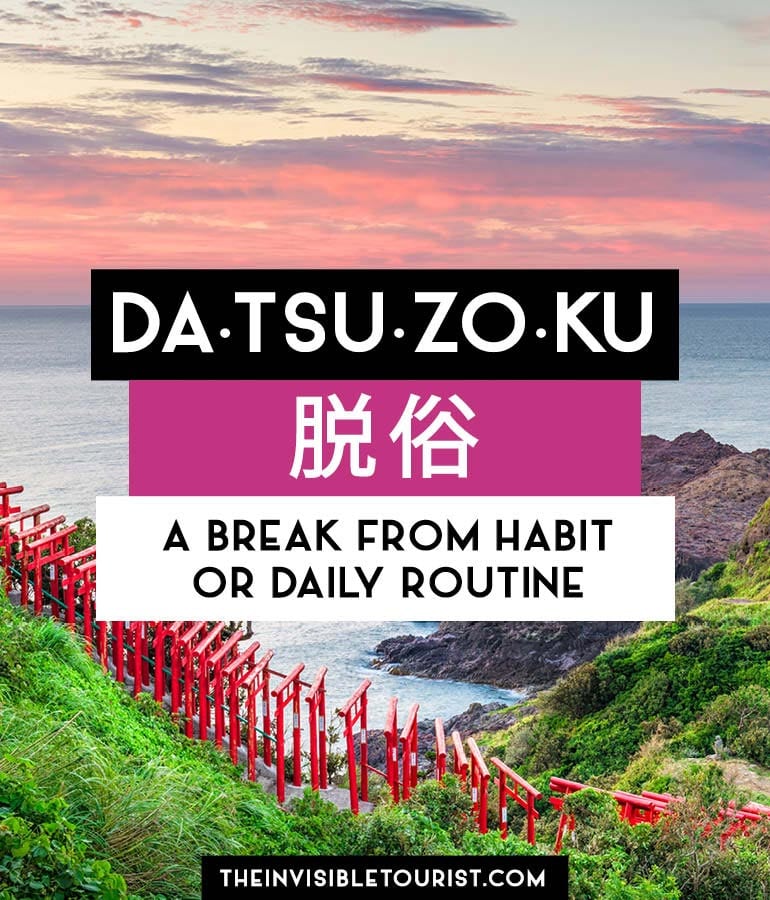
Yugen
幽玄
To put things bluntly, sometimes it’s ridiculously easy to get caught up in the daily grind we forget we’re all on a massive spherical rock hurtling through space at an unthinkable speed. Haha, think about it!
Do you ever take a few moments to stare at the moon and stars? Have you ever thought no matter where we are in the world, we all see the same moon? Yugen translates to “a profound, mysterious sense of the beauty of the universe,” and why it’s one of the pretty Japanese words.
When I gaze into the night skies, I can’t help but think about what an incredible expanse space must be, our galaxy, and our place in the universe. Even if we don’t fully comprehend it, we’re all part of something much bigger than ourselves.
If you’re like me you’ve been reminded of yugen during your travels, especially to destinations steeped in history. Strolling through the centuries-old temples of Kamakura or adoring the gassho-zukuri farmhouses of Hida Folk Village in Takayama reminded me the same sun has risen and set on these structures, each and every day, for centuries. Isn’t that so humbling to realise?
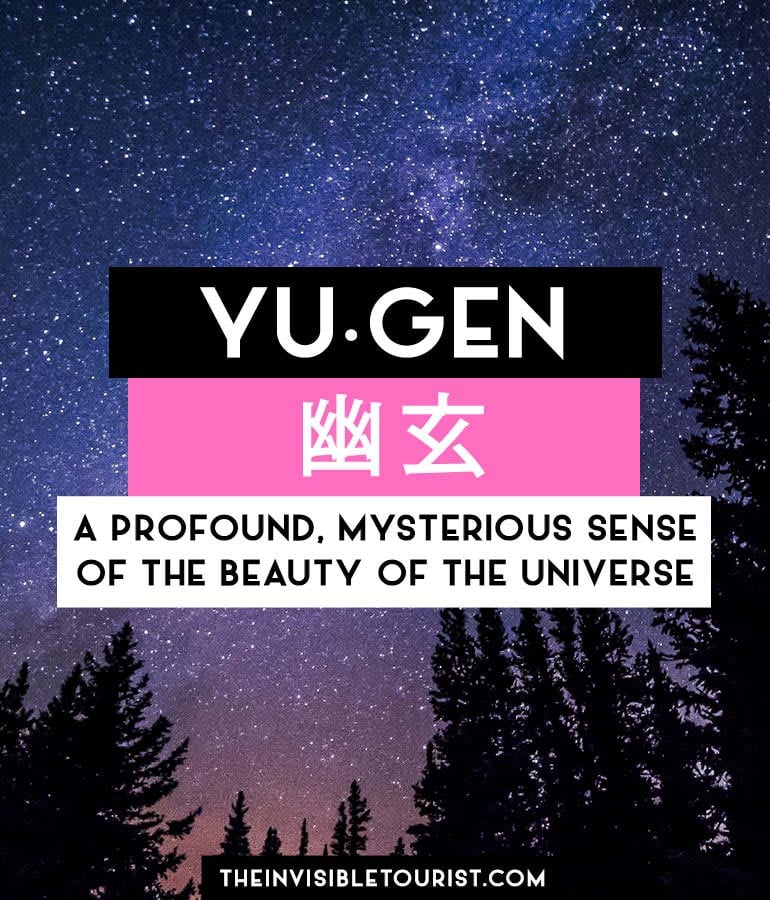
Untranslatable and cool Japanese words
Tsundoku
積ん読
I find this one of the cool words in Japanese. Tsundoku refers to “the act of buying books without reading them,” creating a collection of unread novels and the like. Do you know someone this aesthetic Japanese word could relate to? I’ve been guilty of this in the past!
Although if you do plan on buying a bunch of books to actually read, take a look at my detailed review of the best travel books for Japan to help get your future trip planning off to a brilliant start.

Kuidaore
食い倒れ
Ever wanted to buy ALL. THE. FOOD. in Japan? Of course, there is a cool Japanese word for this. Kuidaore quite literally means to “eat yourself into ruin” by spending all your money on food until you’re bankrupt.
Sounds a little dramatic but when you’re walking down Dotonbori in Osaka and the incredible aromas of sizzling street food meander their way to your nostrils, it’s easy to understand how someone could eat themselves into bankruptcy!
TIP: If you’re hoping to visit Dotonbori someday, my 3 day Osaka itinerary and Nara day trip guide has all the bases covered. Just make sure you leave some small change to buy senbei (crackers) for Nara’s sacred deer!
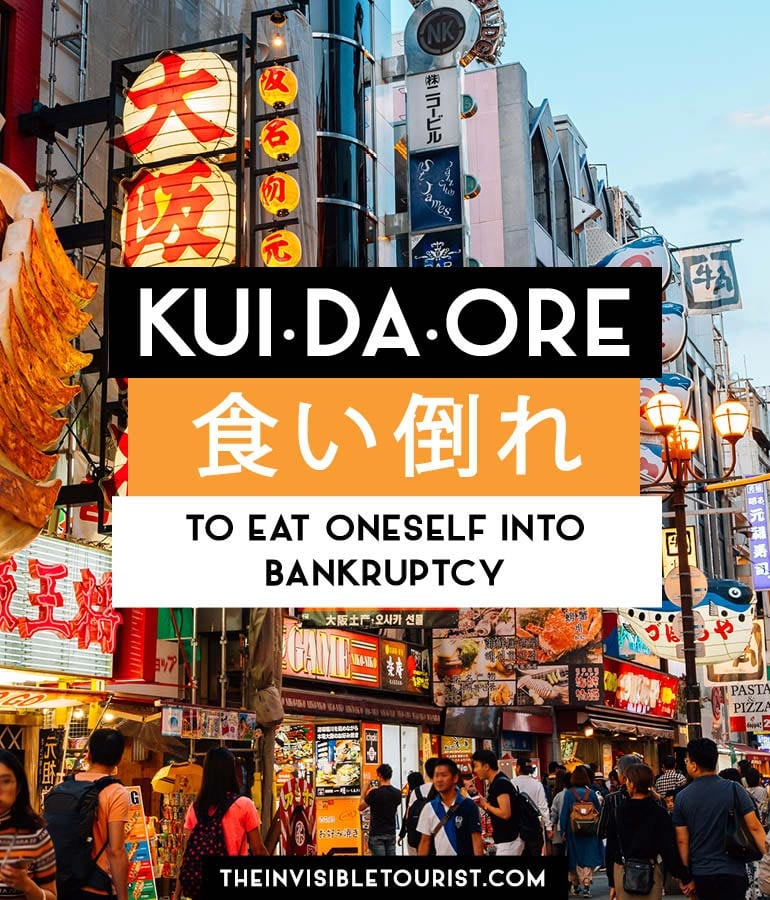
Kuchisabishii
口寂しい
Have you ever had that feeling around 3pm where you need to eat something without actually being hungry? To chew on something just for the sake of it? This is why I love the Japanese language, there is a word for this feeling — kuchisabishii!
Kuchisabishii translates “to eat because your mouth is lonely.” Should I be proud or ashamed to admit this? Haha, in all seriousness though, if you have been craving Japanese sweets and snacks to cure your lonely mouth I have some good news.
Take a look at my guides and reviews for how to have Japanese treats delivered to your door RIGHT NOW – direct from Tokyo!
- Traditional and artisanal Japanese sweets with Sakuraco →
- Trendy and fun Japanese snacks with TokyoTreat →
- Popular and traditional snacks from Japan →
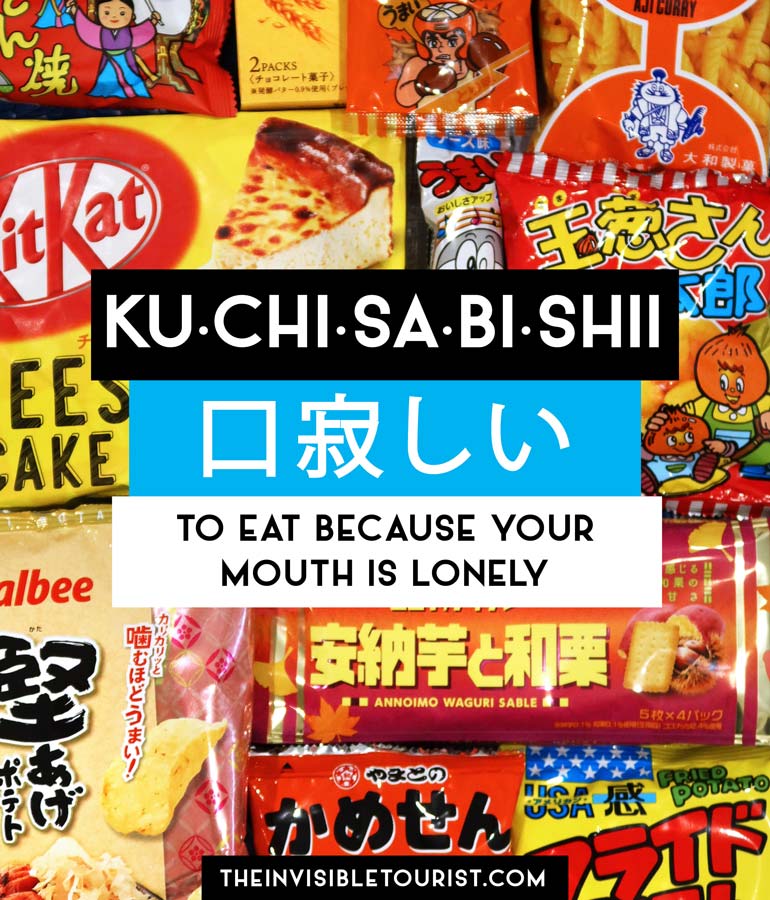
Tips for learning Japanese
Want to learn even more Japanese words and phrases? Remember to download my free basic Japanese phrases for tourists cheat sheet, and make use of the resources I recommend in the article, including this fun Beginner Mastercourse by Japanese With Hikari.
Hikari-san is a native Japanese and certified Japanese teacher with 10+ years experience, and I’ve been enjoying her unique approach to teaching Japanese by combining the best of English and Japanese methods.
While it’s not a live online class, each pre-recorded lesson can be done at your own pace. I love that Hikari-san is always available in the comments section of each lesson to help answer any questions, too.
TIP: Use code INVISIBLE20 for 20% off the course price.
Which are your favourite Japanese words with meaning?
This concludes my all-time, ultimate and favourite Japanese words and meanings! Through learning Japanese in a simple way, we realise we can incorporate different aspects into our own lives. Paying attention to seemingly ordinary things with a refreshed perspective can help bring more meaning into daily life.
I personally find it so satisfying and humbling considering these kinds of expressions don’t exist in the English language. Do you agree?
Which of these Japanese words is your favourite? Did I miss any? Leave me a note in the comments below! I hope you learnt something new and use some of these expressions more often. Now you know what a nakama is, if you’re lucky enough to have one be sure to let them know 😊
Want to learn my strategies for how to “blend in” anywhere around the globe? Find out by reading my #1 Amazon New Release Book!
Are you thinking about visiting Japan someday? Why not check out my popular Japan travel guide while you’re here for inspiration? From must-see destinations to lesser-known places off the beaten path and travel resources, I have your future Japan trip planning covered. You can also come and join me on Facebook, Pinterest, Instagram and TikTok for more Japan inspiration!
Until next time,

Do you love Japanese sweets, snacks and candies?
Read my Tokyo Treat Review and get popular Japanese snacks delivered here, or read my Sakuraco review and get traditional Japanese sweets delivered here!
Like it? Pin it! 📌
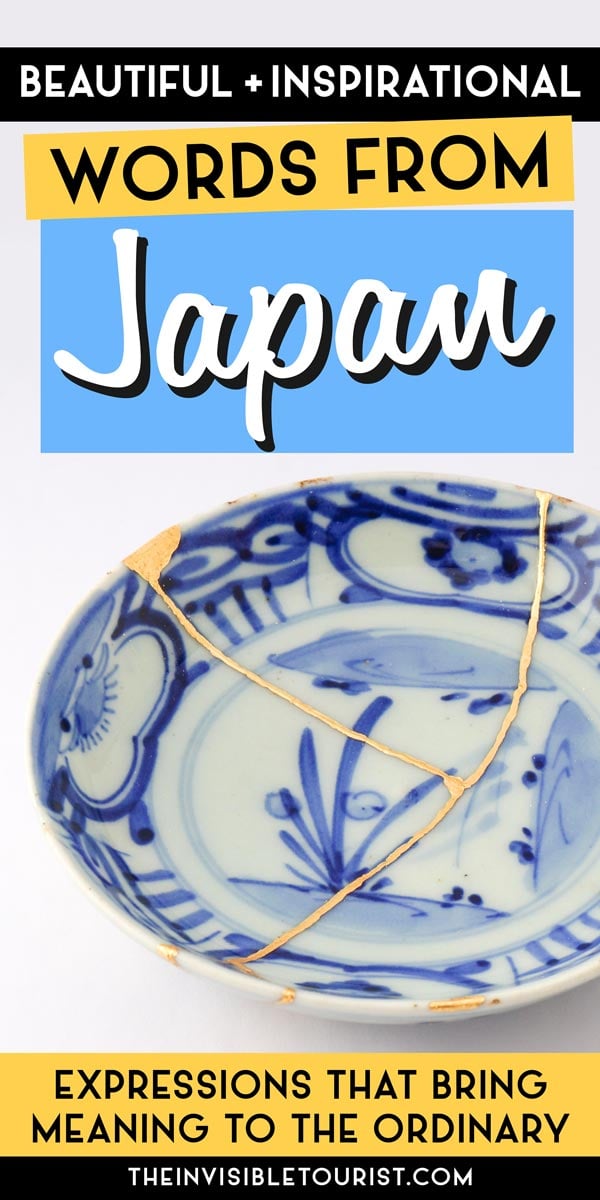

This guide to beautiful Japanese words contains affiliate links, at no extra cost to you. I may earn a small commission if you decide to make a purchase and if you do, thanks for your support! This helps with the costs of running my blog so I can keep my content free for you. As always, I only recommend a product or service that I genuinely love and use myself!


thank you for sharing all of this information it really helps me a lot encourage and learn more about Japan, IKIGAI & GANBARU best here for ME I LOVED IT REALLY 🙂
I’m so delighted to hear that, Evangeline! Thanks for your sweet words 😊
I loved this thank you. Many resonated! I will check out your book.
I was looking for a word I heard that was about elderly people making themselves sweet so they are easy to look after in their aging years
Thank you so much for your kind words, Judy! I appreciate it 😊
I’ve not heard of that one unfortunately, but if I do I’ll be sure to update you here. Thanks for reading!
What was the name of the ikigai book? I see there are quite a few? Thanks
Hi Laura! I linked to it above in the “Ikigai” section, this is it here: Ikigai: The Japanese Secret to a Long & Happy Life
Thanks for reading and I hope you enjoy the book too 😊
Thanks so much! Im looking forward to reading it. And great writing – I loved this
My pleasure, Laura! So glad you enjoyed my article, it was a fun one to put together 😊
Thank you so much, im in middle school and im doing a project on japan, this is so helpful! my favorite work was definitly nanakorobi yaoki. thank you!
I’m really glad you found this so helpful, Lilli! Best of luck with your project (and Daruma dolls are my personal favourite as well) 😃